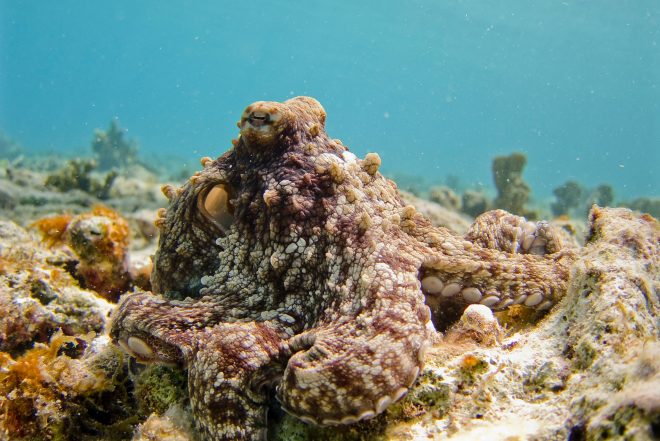
What you need to know on World Octopus Day

From strange habits to alien bodies, octopuses are endlessly fascinating and unique creatures. This World Octopus Day, get an insight into their special abilities and the key to keeping their home, the ocean, safe.
1. Winning at Hide-and-seek
Octopuses are part of the same group of nonvertebrate as snails, oysters and mussels, called the Mollusca Phylum. Unlike the rest of its peers, the octopus lacks a hard, protective shell, leaving it at a physical disadvantage. But the octopus has other clever ways of escaping its predators. It can change its colouring, and even its skin texture, to blend in with its surroundings in as quickly as 200 milliseconds. Its soft body also allows it to squeeze into crevices that can be as small as its eyes, easily evading danger.
2. Thinking outside the box
The octopus has a decentralised brain, meaning that most of its 500 million neurons are not located in its brain, but in its arms, which can smell, taste and even think on their own. An octopus’ arms will continue to move and grab after being cut off from the rest of its body.
3. Pretty handy with tools
The ability to use tools is unusual for most animals. This behaviour has mostly been observed on land animals such as chimpanzees and crows. But the clever octopus has been known to use seashells, bottles or coconut shells as portable homes or to hide themselves. They have also been observed using sticks as weapons to fight off predators or another octopus.
4. Very handy, actually!
When it comes to their living habits, octopuses are solitary creatures. If they’re not seeking shelter in nooks or coral reefs, octopuses build dens out of rocks, even going as far as to fashion a door for their home.
5. Don’t go breaking its third heart
That’s right – an octopus has three hearts. Two of them are tasked with carrying blood to the octopus’ gills. The third pumps blood to the rest of the organs, but it stops when it’s swimming. That’s why octopuses are often seen crawling along the ocean floor, and only swim for short periods of time, when hunting or evading predators.
The UK’s seas are home to some of the most biodiverse life in the world, including the common octopus. But apart from its natural predators, the octopus now faces an even bigger threat. Increasing pressure from human activities is driving a dramatic decrease in marine biodiversity, putting whole ecosystems at danger of collapse.
Today, Marine Protected Areas (MPAs) cover about a quarter of UK seas, but few of them are effectively managed and only three are classified as “No-take Zones”, permanently set aside from direct human disturbance and where all methods of fishing and extraction are prohibited. Fishing, pollution and climate change are putting increasing pressure on marine ecosystems, jeopardising their future.
In 2019, the UK seas failed to meet government standards on good environmental health against 11 out of 15 indicators.
In 2021, after years of relentless campaigning from Ocean Activists and NGOs, the Environment Act was finally brought into law. Alongside tackling sewage and plastic pollution, which is vital to restoring the ocean, the Environment Act also set a target to halt the decline of species by 2030.
But the UK government failed to act towards delivering its targets, and instead declared an #AttackOnNature when it announced plans for its ‘Brexit Freedoms Bill’. A bill that will give ministers the power to remove crucial protections, not just for the survival of ecosystems and species, but also for people, without Parliamentary scrutiny.
We are calling for 30% of the UK seas to be highly protected by 2030. Together with ocean activists everywhere, we will continue to campaign and put pressure on the government to adopt new policies and legislation that ensure marine habitats are able to recover to their natural state.
To find out more about ocean recovery and our ambitions, you can read our report here.
